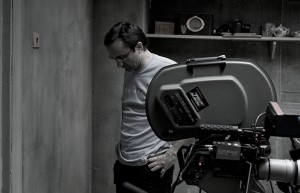By Jake Howell jake.howell@utoronto.ca
Countdown To Cannes: Andrey Zvyagintsev
 The thirteenth in a series of snapshots outlining the nineteen directors in the 67th Palme d’Or Competition.
The thirteenth in a series of snapshots outlining the nineteen directors in the 67th Palme d’Or Competition.
Background: Russian; born Novosibirsk, Siberia 1964.
 Known for / style: The Return (2003), The Banishment (2007), Elena (2011); working with cinematographer Mikhail Krichman, actors Konstantin Lavronenko and Elena Lyadova, and screenwriter Oleg Negin; smaller productions with minimal characters; dazzling on-location images; water motifs; films that dissect social issues of the Russian working class; narratives of family and domestic drama.
Known for / style: The Return (2003), The Banishment (2007), Elena (2011); working with cinematographer Mikhail Krichman, actors Konstantin Lavronenko and Elena Lyadova, and screenwriter Oleg Negin; smaller productions with minimal characters; dazzling on-location images; water motifs; films that dissect social issues of the Russian working class; narratives of family and domestic drama.
Notable accolades: Zvyagintsev (approximately pronounced zvah-geent-sev)’s first film The Return sparked a major rash of awards, but none as big as the Venice’s Golden Lion (also at Venice: the Luigi de Laurentiis Award, SIGNIS award, Sergio Trasatti Award, and the CinemAvvenire award). Heralded by the European Film Awards as “Discovery of the Year” in 2003, the director went on to pick up a Jury Prize at Cannes for his Un Certain Regard film Elena (2011), with many critics claiming it should have played in Competition. He’s won three FIPRESCI prizes, snagged a “high commendation” for directing at the Asia Pacific Screen Awards, and secured even more prizes at local and smaller European festivals.
Previous Cannes appearances: In 2007, Zyvagintsev moved on from the Lido and debuted Competition title The Banishment on the Croisette, where it was received with mixed reviews. Perhaps as a result, Cannes slotted his follow-up Elena into Un Certain Regard. 2014 will mark his second film in Competition.
 Film he’s bringing to Cannes: Leviathan, a Russian-language drama. From IMDb: “Spanning multiple characters about the human insecurity in a “new country,” [Leviathan] gradually unwinds to a mythological scale concerning the human condition on earth entirely.” According to Leviathan producer Alexander Rodnyansky, the film is “a story of love and tragedy experienced by ordinary people.” Rejoining Zvyagintsev for his fourth feature are scriptwriter Olen Negin, cinematographer Mikhail Krichman, actress Elena Lyadova, and Elena sound designer Andrey Dergachev. The film is a contemporary spin on the Book of Job, meaning Zvyagintsev’s typically small cast size has been ramped up considerably to tell a larger story.
Film he’s bringing to Cannes: Leviathan, a Russian-language drama. From IMDb: “Spanning multiple characters about the human insecurity in a “new country,” [Leviathan] gradually unwinds to a mythological scale concerning the human condition on earth entirely.” According to Leviathan producer Alexander Rodnyansky, the film is “a story of love and tragedy experienced by ordinary people.” Rejoining Zvyagintsev for his fourth feature are scriptwriter Olen Negin, cinematographer Mikhail Krichman, actress Elena Lyadova, and Elena sound designer Andrey Dergachev. The film is a contemporary spin on the Book of Job, meaning Zvyagintsev’s typically small cast size has been ramped up considerably to tell a larger story.
Could it win the Palme? Leviathan is sure to be a major front-runner, despite screening on the very last day of the Festival (something Zvyagintsev should be used to, with Elena closing Un Certain Regard in 2011). Given the scope and intention of the production, there is a possibility the film grew too large (this is the director’s biggest budget to date), but nevertheless this is a keenly anticipated Competition title; one that is tipped to be an awards giant.
Why you should care: Called a “sophomore slump” by some, The Banishment is the director’s least successful film as far as critics were concerned; outside of that, Zvyagintsev’s first and third features are compared to work by Russian film heroes like Tarkovsky. It’s also the only Russian film in Competition, and given how many films are made there locally per year, you can bet this hand-picked title is likely very strong.
Follow Jake Howell on Twitter: @Jake_Howell
Previous Entries:















